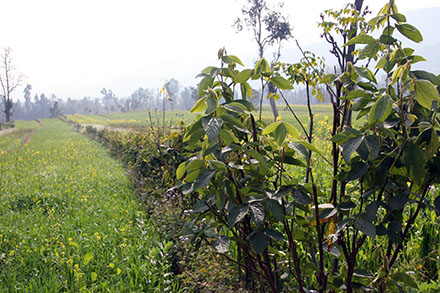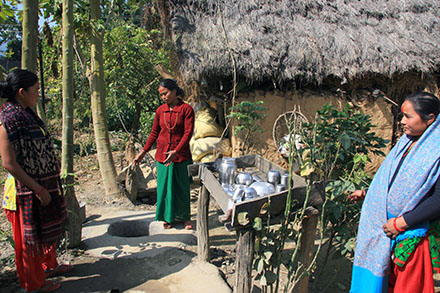Last month, I traveled more than 370 miles west from Kathmandu into the remote hills of Surkhet District to meet a group of women creating waves of change in their community.
Bhansghari Women’s Self-Help Group (SHG) has 23 members, and the majority belong to a Dalit community. Dalits are considered untouchable according to the traditional Hindu caste hierarchy. One would never guess the shame and humiliation these women have been put through solely for being born into a certain caste. They welcomed me with warm smiles into their homes and offered delicious food prepared with much love and care.

As I munched down my delicious meal, prepared from locally grown, fresh produce, Sarita Sunar, the group’s secretary, shared the changes they have experienced in past few years.
“Discrimination based on caste and gender was rampant. People followed traditional orthodox beliefs blindly,” Sarita said. “(My community was) hesitant to change, and any new thing was viewed with suspicion. Due to this perception, community development was nonexistent.”
When Heifer and its partner organization staff initially arrived to plan for a project in Sarita’s village, all the women, children and elderly hid inside their houses.
“When I was called upon to discuss the possibility of forming women SHGs, I ran out the back door into the fields,” group member Sita B.Ka said in between chuckles. “My husband came after me, but I didn’t want to listen and begged him not to involve me in these things.”
Today the project has grown to include 264 households, and women across the village work together for the community’s wellbeing. Bansghari SHG members received income generation and capacity building trainings along with gifts of goats, fodder and seeds/saplings.
Group member Kharisara Budamagar said, “Initially most of us joined the group because we felt obligated. The first thing we did was receive Heifer’s 12 Cornerstones training. That experience was very important in helping us break through our hesitations and openly share with each other. Today we are united and can achieve anything.”
Help empower women like Sita, Kharisara and Sarita to make waves of change in their community.
One of the group’s biggest independent achievements has been the construction of a 1.24-mile road. Because of the road’s terrible condition, the monsoon season rains made it impossible to cross. Local schools were forced to shut down, and the women couldn’t get to the mills to grind their grains.
“(A) few years ago, a tractor had slipped on the muddy road, and the driver’s passenger lost his life,” Sita said. “Each year during monsoon season, we feared traveling on the road. So, our group wrote to a local businessman who happily agreed to provide his tractor service free of cost. The group gathered the entire community and worked together on the road construction. We are proud of connecting our village to the local markets without any interruption.”

The group then began working toward improving the management of the communal tap that the entire community uses for drinking water. The water collection area was dirty and unsanitary. The women raised money from the community and plastered the floor. They cleaned the area and put waste bins in all public places and outside all the houses. Now both the water collection area and the entire village is free of plastic waste and litter.
The women also leased about a half-acre to establish a field for fodder, and they share the responsibility for watering the plants. All members receive equal shares of the fodder to feed their livestock. Furthermore, they have been able to save the seeds to increase their plantation.
Walking through the village, I noticed that all the houses had a small pond where kitchen wastewater is collected for gardens. This practice has increased vegetable production in absence of an irrigation facility. The group successfully lobbied a local NGO to bring a drip irrigation project to their village. This initiative has helped the community farmers reduce energy spent on fetching water from the river while increasing their harvest.
The group’s cohesion trickles down to individual prosperity. Maimi B.Ka has invested her income from goats into her son’s education, Kharisara used her SHG savings to open a grocery shop and Sarita reinvested her goat income to establish a poultry farm.
It is powerful to see women who were once dependent on their husband’s earning responsible for uniting the community and creating a resilient economy.
Story and photos by Alina Karki, Associate Communication Officer, Heifer Nepal